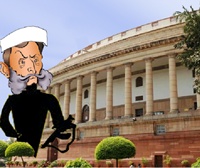Crime pays in Indian politics, crooks likelier to win polls: study
31 Jul 2013
In India, criminal politicians are more likely to be successful than honest ones, a study revealed yesterday.
 The analysis of self-sworn affidavits of candidates by Association for Democratic Reforms (ADR) and National Election Watch (NEW) has thrown up startling facts about criminalisation of politics and corruption.
The analysis of self-sworn affidavits of candidates by Association for Democratic Reforms (ADR) and National Election Watch (NEW) has thrown up startling facts about criminalisation of politics and corruption.
An analysis of affidavits submitted by candidates in parliamentary and assembly elections since 2004 shows that a higher proportion of those with a criminal record were elected than from among those without such a record.
The study found that only 12 per cent of those with a clean record won, as against 23 per cent of those who a serious criminal record.
Being more likely to win, candidates with a criminal past are also the preferred choice of political parties, the study says.
Moreover, a candidate's assets are likely to skyrocket after a five-year term by up to 1,000 per cent.
Of 62,847 candidates whose affidavits were analysed, 18 per cent had declared criminal cases.
Among MPs and MLAs, those who had declared cases accounted for 29 per cent. This included 30 per cent of Lok Sabha MPs, of which 14 per cent have serious cases against them, and 31 per cent of sitting MLAs, including 15 per cent with serious charges.
"Not only do our results show that a candidate with a criminal background has higher chances of getting elected, what is interesting is that even in the Rajya Sabha, which was originally supposed to be a house where eminent people who could advise the government were to be members, 17 per cent of sitting MPs have declared criminal cases against them, of which 7 per cent are serious charges like murder," said Trilochan Shastry, founder-member of ADR.
The study also highlights the correlation between money and criminality. 'Tainted' politicians were found to be wealthier than others. The average assets of MPs and MLAs with serious criminal cases were worth Rs4.38 crore.
Professor Jagdeep Chokkar, who worked at IIM Ahmedabad and is a founder member of ADR and NEW, said, "(The) nexus between crime and money has been exposed ... If the electoral process is governed by crime and money what moral rights do we have to call ourselves a democracy?"
The highest percentage of criminal legislators was from the Shiv Sena. Of 137 Sena MPs or MLAs, 103 have declared criminal cases against them.
In the Bharatiya Janata Party, out of 1,689 MPs or MLAs, 520 have declared criminal cases; while of the 2,451 Congress MPs or MLAs, 527 have cases against them.
The report says 162 (30 per cent) of the 543 present Lok Sabha members face "criminal cases" and 76 others "serious criminal cases''.
The abnormal growth in assets of candidates also poses serious questions on their integrity as the average increase of assets of a common citizen is nowhere near the increase of politicians.
A total 62,847 candidates contested either state or parliamentary elections, of them 4,181 candidates re-contested elections. Of these, the assets of about 1,615 candidates showed an increase of over 200 per cent, 684 showed an increase of over 500 per cent and 317 candidates of over 1000 per cent.
In terms of assets, it was Shiromani Akali Dal (SAD) which tops the chart with average assets of a candidate being Rs6.02 crore.
The report released on elections, crime and money is based entirely on self-declared affidavits of the candidates. "As per the Supreme Court order, election candidates have to submit an affidavit declaring details of criminal record, education and assets. Association for Democratic Reforms (ADR) has been systematically collecting and compiling information from these affidavits as and when they were filed since 2004," said Trilochan Sastry.
"It's high time that a country like ours got leaders who were honest and more capable to form the government. There is no positive sign in the analysis that has come out," said Sastry.
"Many years ago, Lal Bahadur Shastri had resigned as railway minister taking moral responsibility for a train accident. That's the standard we expect from the leaders," he added.



















